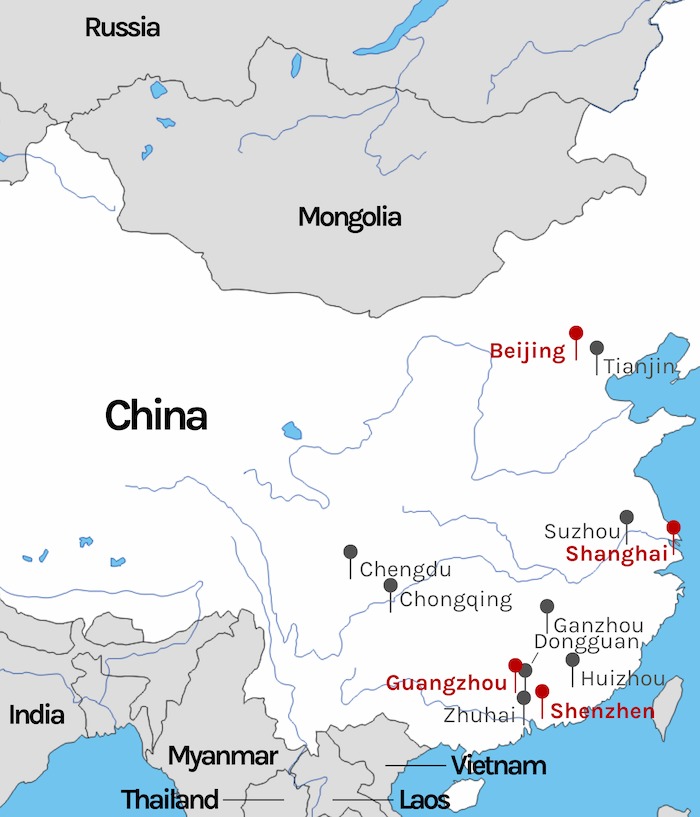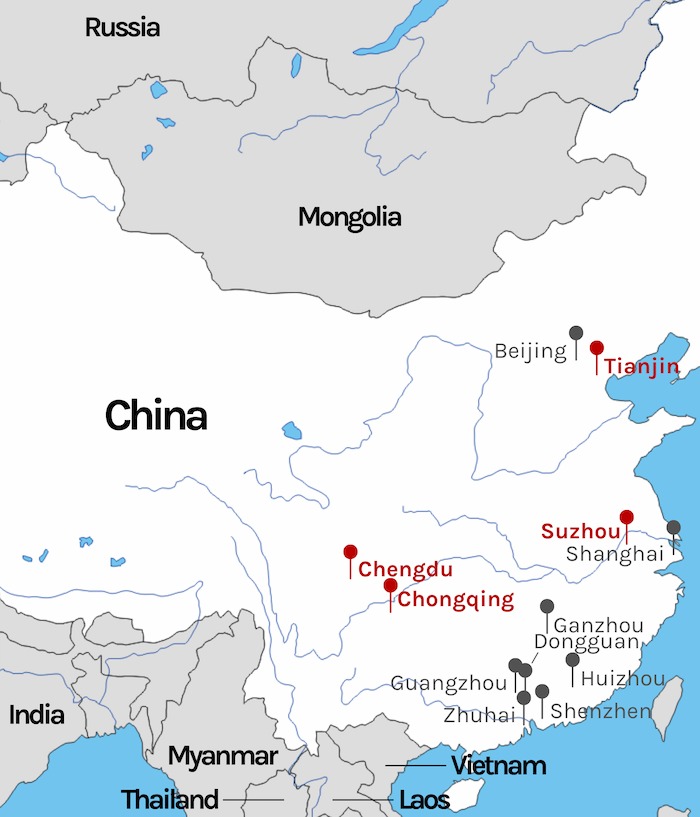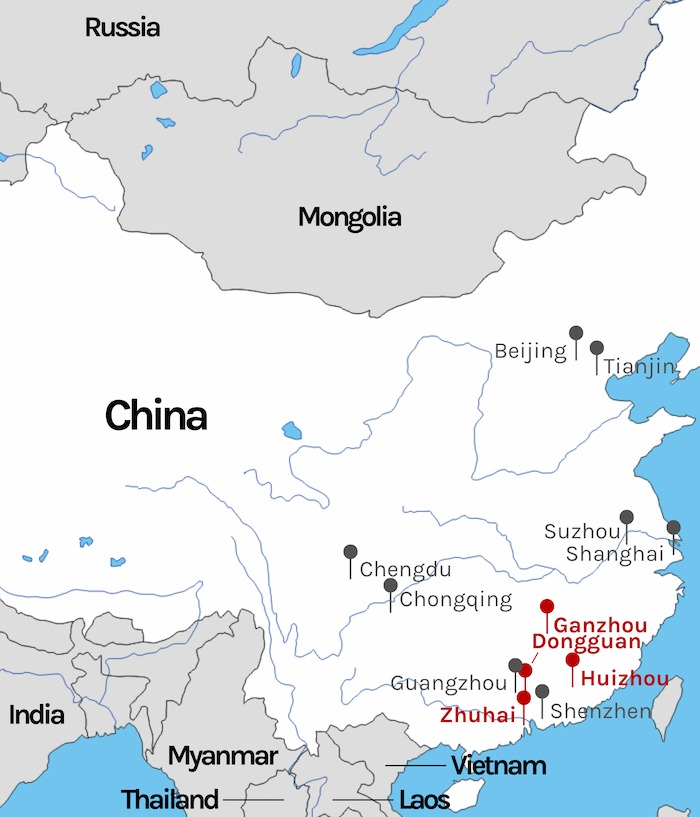Teach English in China
China offers high salaries, a low cost of living, and great travel opportunities!
Salary and benefits while teaching in China
China offers a diverse array of school options for prospective teachers, making it essential to conduct research to identify the best fit for your lifestyle, salary expectations, and time-off preferences. Each type of school comes with its own set of trade-offs to consider. For instance, if a higher salary is a priority, you might explore opportunities in international schools, albeit with potentially longer working hours. On the other hand, if a better work-life balance is your preference, universities with fewer working hours and lower salaries could be a suitable choice.
China offers some of the highest-paid overseas teaching jobs in the world. This coupled with a low cost of living, gives you the chance to live comfortably while saving money every month!
Here’s how experience & qualifications can affect your earning potential:
Bachelor’s Degree:
This is the minimum requirement for teachers in China to qualify for a Z-visa. Possessing this should set your starting salary at no less than 8,000 RMB/month + housing but usually 13,000 RMB/month or more for full-time work.
TEFL/TESOL Certification or 2-years teaching experience:
This is the minimum requirement for Teaching Nomad and to qualify for a work permit in China. If you need to complete a TEFL certification, click here for information about self-paced and instructor-led TEFL courses.
Teaching license and/or degree in education:
If you are licensed to teach in your own country, the sky is the limit in China! Licensed teachers are in high demand at international schools as well as English medium schools for local students. Salaries typically start at 18,000 RMB and can go up all the way to 40,000 RMB a month or more.
Post-graduate degree:
If you’re working in K-12 schools, an M.Ed or PGCE will likely earn you higher pay and more advancement opportunities. Learn about M.Ed programs you can complete while overseas.
Location:
Chinese cities are usually divided into different tiers. The pay and living expenses are generally much higher in tier 1 cities like Shanghai and Beijing than in tier 2 or 3 cities.
Hours:
As you can imagine, the number of hours you work will affect your salary. Training schools generally require you to teach 20 hours, and typically pay between 12,000-25,000 RMB. At kindergartens and preschools, you can expect a similar number of teaching hours. Though the teaching hours at public and international schools are not much different, they require more class preparation time and are stricter on office hours.
Benefits:
Many schools provide teachers with housing and reimburse for airfare. In first-tier cities, some schools provide a stipend instead or simply pay a higher salary. Health & accident insurance is always included, though the terms might vary by school. Employers that require you to live on campus—some international and public schools—will provide meals in addition to free housing.
Why teach abroad in China?
China presents abundant opportunities for native English-speaking teachers. Whether you opt for teaching English in a private language training school or various subjects in a public school, international school, or university, the options are diverse.
Teaching in China not only opens up a range of opportunities but also provides extra income for your travel or other endeavors. The initial challenge lies in getting to China from your home country; however, once you’re there, seamless travel to neighboring countries like Cambodia, Thailand, and Japan becomes readily accessible.
Considered among the best in the global ESL market, teaching English in China offers attractive features such as high wages, a low cost of living, and substantial demand for foreign teachers. Comparable to the opportunities that existed in South Korea years ago, China has now emerged as the epicenter for teaching abroad.
Overview
Requirements to teach in China:
- Hold a Bachelor’s degree
- 2+ years of teaching experience for K-12
- No experience required for training schools
- Native English speaker
Average monthly salary in China:
7,000 – 40,000 RMB / month
This varies based on experience, hours worked, city, and the type of school that you work in.
Cost of living per month in China:
2,250 – 15,000 RMB / month
This varies by lifestyle and city that you choose to live in.
Growth of the education sector
Chinese parents highly prioritize their children’s education, leading to a surge in demand within both the public and private education sectors. Fueled by the increasing spending power of the rising middle class, millions of families can now afford to enroll their children in schools with native English-speaking teachers. This demand extends across the entire country, including lesser-known cities, creating a substantial need for teachers, particularly ESL teachers.
It’s essential to recognize that teaching is a service, and China’s growing economy places an ever-expanding demand on the service sector. For teachers, this translates to a continuous rise in demand, outpacing the growth in supply. Consequently, teachers who choose to work in China can expect to earn a lucrative income.
Presently, the fastest-growing segment of education jobs in China is at the professional level. There is a rising demand for instructors experienced in various curriculums such as U.S./AP, local, British National, and internationally accredited programs like International Baccalaureate (IB). This demand continues to escalate each year. On the flip side, the demand for recent university graduates and less experienced ESL teachers consistently surpasses the available supply.
Whether you’re a beginner teacher or a seasoned professional, Teaching Nomad is dedicated to finding a position that aligns with your needs.
Curriculum used in China
There are many different types of schools in China, and they use a variety of different curriculums. It’s important to know a little bit about each curriculum so you can choose the one that you’re most comfortable teaching and search for an overseas teaching job based on your preference. Even if you don’t have a preference, it’s helpful to understand which curriculums you may run into while teaching in another country. Some of the most common curriculums taught in China are IB, U.S./AP, local, and British National.
Learn more about other curriculums taught all over the globe.

Teaching IB in China
As of 2023, there are 267 schools in China that use the IB curriculum. This equates to thousands of IB teaching positions, many of which are available to foreign teachers. Learn more about teaching IB in China, and check out the history and an overview of teaching IB abroad in our blog.

Teaching U.S./AP in China
Numerous schools in China provide AP courses for students. To offer these courses, schools must submit their curriculum to the AP program, ensuring compliance with established standards. Teachers play a crucial role in preparing students for the AP exams, typically scheduled in the first two weeks of May.

Teaching the local curriculum in China
The Chinese national school curriculum encompasses familiar subjects like math, science, social studies, fine arts, and PE, aligning with global standards. In addition, it incorporates elements of morality, ethics, and, prominently, the Chinese language. Traditionally, Chinese instruction has followed a lecture and testing-oriented approach. While some schools are transitioning to more student-centered instruction, testing remains a primary focus. This emphasis is particularly evident in the notorious GaoKao 高考, a crucial examination determining entrance into higher education institutes.

Teaching the National Curriculum of England in China
The National Curriculum of England serves as the established set of standards applied throughout England & Wales, ensuring a uniform learning experience for all students as they progress through schooling. Structured into four mandatory key stages spanning ages 5 to 16, with an optional key stage 5 for ages 17 & 18 (years/grades 12 & 13), often referred to as college in the British context, this curriculum is commonly adopted by international schools.
Defining the foundational elements of learning, the curriculum outlines the subjects, knowledge, skills, and developmental milestones associated with each subject. It also establishes the expected proficiency levels for students in each subject and outlines the assessment methods. Within this framework, schools have the flexibility to plan and organize lessons according to their discretion.
Accreditation for the National Curriculum of England is directly granted by the UK Department of Education. Overseas schools follow a scheme called BSOs (British Schools Overseas) to ensure they meet the standards equivalent to those of UK schools.
Why consider teaching in China?
China stretches over 1,700 miles from Harbin in Heilongjiang province, home to the renowned Harbin ice festival, to the humid subtropical climate of Hong Kong. Each city boasts distinct character, and the local residents take pride in the rich diversity across the country.
The opportunities to teach English in China mirror the country’s diversity. Different schools and regions offer unique experiences, with a business English instructor in bustling Shanghai having a markedly different experience than a kindergarten teacher in Chengdu. City attractions, local culture, and language vary, allowing your placement consultant to tailor your experience to your preferences.
Teaching opportunities in China span preschools, kindergartens, primary and secondary schools, universities, and adult training schools. Freelance and hourly lessons, along with the growing trend of online teaching, provide additional flexibility. Working with Teaching Nomad ensures well-compensated positions, even for beginners, based on individual experience and qualifications.
Teaching contracts typically range from 1 to 2 years, reflecting the maturing education market and rising salaries. Schools seek committed teachers, discouraging short-term commitments to provide continuity for students. While beginners are welcome, a serious approach and adherence to contractual obligations are essential. Regardless of your desired location, numerous teaching positions are available for you to choose from.
- Shanghai
- Beijing
- Shenzhen
- Guangzhou
Include Tianjin, Chongqing, Chengdu, Suzhou, Hanzghou, Xiamen, Fuzhou, Wuxi, Hefei , Kunming, Wuhan, Nanjing, Xi’an,
Include Dongguan, Ganzhou, Huizhou, Zhuhai, Weifang, Baoding, Zhenjiang, Yangzhou, Guilin, Tangshan, Sanya, Huzhou, Hohhot
Certain areas within tier 1 cities might easily be mistaken for Western cities. With over 145 cities in China boasting populations of 1 million or more, dozens fall under the tier 2 status, often featuring an underground metro system, airport, high-speed train station, and popular franchises like KFC and Starbucks. While Shanghai attracts many due to its international reputation, teaching in tier 3 cities offers a more off-the-grid adventure, providing a full immersion experience with limited access to imported goods and fewer English speakers.
Teaching Nomad presents opportunities in all three city types, spanning from Harbin in the north near the Russian border to Hainan island in the South China Sea and Chengdu in Sichuan province to the west. Although the majority of our schools are in tier 1 and tier 2 cities, we also offer exciting opportunities in tier 3 cities for those seeking a real adventure.
Shanghai, as the most international city in China, boasts numerous teaching jobs. It’s important to note that while salaries in Shanghai may surpass those in many tier 2 or 3 cities, the cost of living is considerably higher than in most mainland China locations.



Types of schools in China
There are many different types of schools to choose to work at in China, so you’ll want to do a little research on each one to figure out which type will best suit your lifestyle, salary, and time-off needs. There are often trade-offs that you will need to consider with each type of school. For example, if you want a higher salary, you’ll need to work more hours, so maybe you should consider an international school. However, if you want more time off, you may want to work at a university where you’ll have less working hours and a lower salary.
Training centers in China
These schools are attended by kids or adults in the evenings and weekends specifically for English language instruction.
Positions at training centers are often easiest to secure as there is a high demand for these classes, and they hire year round. Schools in this category include many large chains like English First. Each center has its own specialized curriculum, teaching and training materials which means planning and preparation are at a minimum.
The higher-paying jobs generally do not include housing. If you’re willing to teach up to 40 hours a week, you can make around 25,000rmb/month.
Preschools and kindergartens in China
The institutions cater to children aged 18 months to 6 years, offering abundant opportunities for teaching English in kindergartens and preschools. This role is particularly prevalent in China’s prominent cities like Beijing, Shanghai, and Guangzhou.
Teachers can anticipate a welcoming work environment with the support of one to three Chinese teaching assistants per classroom. Ample engaging teaching materials are provided, minimizing preparation time. Classes typically consist of 8-20 young learners and run for 20-40 minutes, ensuring a dynamic and efficient teaching experience.
International schools in China
These educational institutions attract professional expatriates and affluent local families who prioritize quality education for their children. With high tuition fees and intense competition for enrollment, teacher compensation is notably lucrative, especially for those with children. However, these sought-after positions typically demand a teaching license and graduate degree.
Following a traditional two-semester schedule, classes are predominantly conducted in English. Prospective teachers should be prepared for a 2-year commitment to these schools. Preference is often given to educators with experience and familiarity with either the International Baccalaureate (IB) or other foreign curricula such as A-levels/AP.
Public schools in China
Public schools (particularly in bigger cities) score well on all fronts. Decent salary & benefits, reasonable teaching load, and more paid vacation days. Since Chinese public school education is notoriously competitive, your students will be diligent, well-behaved, and smart but you will sometimes have up to 60 of them in your classroom! Jobs in this category will sometimes require a graduate degree and/or a teaching license.
Universities in China
There is a lot of variety within these jobs. Positions at smaller universities usually hire foreign teachers to teach required English classes, some universities are less selective when it comes to hiring foreign teachers. Even if the university originally hired you to teach a specific subject, entry-level teachers will rarely be teaching anything other than oral English. Salaries are usually between 7,000-30,000 RMB/ month (dependent on location, experience, and hours worked), but teachers are paid during the summer and winter breaks and never have to teach more than 20 periods a week. Jobs at universities are therefore more competitive than English training centers. The university curriculum is flexible and the foreign teacher is responsible for creating teaching materials.
High-ranking public universities, especially in big cities, are a different story. Salary and benefits will be much higher but you may be expected to possess an advanced degree and considerable relevant teaching experience.
Schedule and start dates
K-12
Fall starts in August/September
Spring starts in February/March
University
Fall starts in August/September
Spring starts in February/March
Training Schools
Rolling start dates year-round
Start anytime!
Both K-12 schools and universities in China align with the scheduling patterns of western countries. The fall semester typically commences in late August or early September, while the spring semester begins post the Chinese New Year, following the lunar calendar. To secure fall positions, we recommend applying 4-5 months ahead, and for spring positions, 2-3 months in advance. Beyond traditional academic institutions, China boasts a significant number of training schools that actively recruit new teachers on a monthly basis. Regardless of your schedule, we are well-equipped to assist you in discovering the finest teaching opportunities available.
China Document Apostille
To obtain a work permit for China, you’ll need to apostille your university degree and recent background check. This can be a difficult process on your own, so we offer a service that gets it done for you, hassle-free!
FAQ’s
What are the differences between ESL, EFL, TEFL, TESL, TESOL, and TOEFL?
English as a Second Language (ESL) implies the teaching and learning of English in an English-speaking region.
Example – A child moves to the United States from Mexico, and they begin learning English in an ESL class.
English as a Foreign Language (EFL) implies the teaching and learning of English in non-English speaking regions.
Example – A child in Russia is taking an EFL class in school.
Teaching English as a Foreign Language (TEFL) is the term used for teaching English in a country where it is not the primary language.
Example – A United Kingdom native going abroad and teaching English in China.
Need a TEFL certificate still? Check out our in-class and online options. Also check out our TEFL Course Live that combines the fantastic curriculum of our Shanghai in-class TEFL course with online learning – get the benefits of the in-class course without having to leave your home!
Teaching English as a Second Language (TESL) is the term used for teaching English to non-native speakers that are located in an English speaking country.
Example – An Australian teaching English to students that have moved from Japan to Australia.
Teaching English to Speakers of Other Languages (TESOL) incorporates both TEFL and TESL practices. A TESOL certification is known for having rigorous standards for teachers, a prescribed curriculum, and a minimum of six hours of supervised practice teaching in an actual student-classroom environment. A TESOL certificate is widely recognized by EFL teaching schools and programs as the mark of a well trained, highly qualified EFL teacher.
On the student side, the Test Of English as a Foreign Language (TOEFL) is a widely recognized test of proficiency in the English language. At most U.S. and U.K. colleges and universities, a verifiable passing mark on the TOEFL exam is a requirement to matriculate for all students from non-English-speaking countries.
Do I need to speak another language?
No, as a matter of fact, the schools do not want you to speak Chinese in the classroom. In many cases, you will work with a local Chinese teacher in the classroom that can translate if needed. Assuming you would like to learn Mandarin, you can search for classes online, find a private tutor, or sign up for group classes.
What will my travel expenses be?
First, you will need to need to prepare and apostille your documents, get your work permit from your school, and get your Z-Visa.
After that, your two main expenses will be airfare and hotel stay upon arrival. All of the teaching jobs that we offer provide some form of compensation for these expenses. In some cases, the school will pay for the airfare and hotel upfront. However, other times you will need to pay for it, and the school will reimburse you afterward. It is crucial to have savings to cover your initial month’s expenses until your first paycheck is received.
Do I need any kind of teaching certification or experience?
At this time, all of the teaching positions we offer require either 1 year of teaching experience or an internationally recognized TEFL/TESOL/CELTA certification. Candidates with experience and a teaching certification will be first in line for the higher paying positions, but it is not necessary to have both. To assist our teachers with this, we offer online courses and in-class courses.
Do I need a university degree?
What are the best teaching jobs in China?
The answer to this question really depends on what you are trying to accomplish while you are here. Are you looking for experience to help build a teaching career? Is money a big concern? Do you want as much time to travel as possible? Knowing what you prioritze will in-turn help you deicde which roles are best for you.
How much will I get paid?
Salaries and bonuses will vary greatly by region and by the type of school that you work at. Some parts of China have a considerably higher cost of living than others. On average, full-time teachers will make between 7,000-40,000 RMB per month. Keep in mind that with the cost of living in China, an amount in this range will allow you to have your own apartment, a housekeeper, and a healthy savings account! Compensation can also include free airfare, a starting bonus, a housing stipend, and a contract completion bonus.
How to write your teach abroad resume/CV
Your resume or CV (Curriculum Vitae) will probably follow a similar outline to what is used in your home country but there are some things you can add to make it stand out from the crowd.
Basic information:
You probably wouldn’t have this information on a CV in your home country but work visa regulations have rules on age and nationality so you will want to add that.
Always include a photo. A passport-style “headshot” is perfect. The schools want to know what you look like, and after you’re hired, this photo will be submitted with your other documents to secure your work visa.
Additional suggestions:
When listing work experience there is no need to write a paragraph about each job. A basic explanation along with some bullet points is perfect. Be sure to clearly list the dates of employment and if you really want to stand out, add the name and contact information to a reference at the company!
Check out our blog post about how to write your teach abroad resume/CV.
Does Teaching Nomad have fees?
Teaching Nomad’s services are completely free for teachers! We will help you through the entire process, whether it’s interviewing with schools, looking over a contract, or ensuring your safe arrival in China. We make money by charging a fee to the schools that hire our teachers. In addition, using our services will not affect your monthly pay whatsoever; we’re here to support you!
How do I get a work permit, work visa, and a residence permit?
To legally work in China as a teacher, your school will need to assist you in obtaining a work permit and a residence permit from the Chinese government. Only legal, licensed schools can actually hire foreigners which is one of the reasons that Teaching Nomad exists. We only work with schools that are trustworthy and reliable.
Here’s how the process works:
2. You send scans of the documents to your school, and they will request your work permit from the Chinese government.
3. The work permit along with an invitation letter will be sent directly to you.
4. Once you receive those, you will need to submit this paperwork along with your passport and visa application either directly to the Chinese embassy in your home country or to a visa agent like us. There will be a fee to pay which varies by country. Within 3-7 days, you will get your passport back in the mail with a temporary Z-Visa inside. This temporary visa is good for 30 days and is designed for you to enter China.
5. Once you’re in China, your school will assist you in converting this temporary visa into a residence permit. This process could take 2-6 weeks during which you will not have your passport. We do suggest you make a copy of it before it’s out of your possession. The government also requires you to have a physical exam done. It’s pretty basic and is usually completed in China. In some cases, your school may send you a medical exam form that you can use to have the exam completed in your home country.
What our teachers are saying
My recruiter/consultant was Jayne Donabie and she was so helpful and patient from start to finish. She was always available to answer my questions, whether via email or a Skype call. She is knowledgeable about each of the schools that she represents and can offer great insight into living in China as an expat. She made what could have been an overwhelming and complicated process really straightforward and stress-free. She made me feel confident in my decision to move forward with my applications and to move to China.
After a friend recommended Lauren Klein at Teaching Nomad to me, I decided to chat with her about teaching opportunities in China. She asked me a number of really helpful questions to assist me in figuring out the kind of position that would be best for me. She answered all questions I had within a day and was incredibly accommodating when my school preferences changed during the recruitment process. Lauren got me three interviews with great schools, and I’m sure I could have had as many as I wanted if I didn’t like one of those three. In the end, I found a great job, and I barely had to do a thing more than showing up to the interview. All in all, I highly recommend Lauren and Teaching Nomad.
I would highly recommend Teaching Nomad to anybody looking for teaching positions in China. My recruiter was Moira and she was professional, helpful, and patient from the very start. If anybody is looking for teaching positions overseas, definitely contact Teaching Nomad. I only have good things to say about them.
Blogs about teaching in China
Learn all about teaching, traveling, and living abroad!
Experiencing Teacher’s Day While Teaching in China: A Celebration Like No Other
Teaching in China is not just a job; it's an adventure into a new culture, a dive into a deep historical legacy, and a chance to influence future generations profoundly. One of the standout experiences for educators each year occurs on September 10th—Teacher’s Day....
China’s Holidays Unveiled for 2025!
Whether you are planning your first trip to China or are a seasoned expat, staying informed about the public holidays can significantly enhance your living and traveling experience. Chinese holidays not only offer a glimpse into the rich tapestry of cultural...
The History of Chinese New Year
As we embrace the festivities and traditions that come with Chinese New Year, it is essential to look back at the origins and evolution of this centuries-old festival—complete with mythical stories, astronomical calendars, and traditions that continue to influence how...





